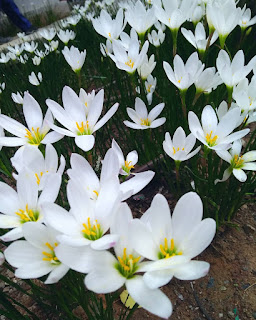Wednesday, 28 July 2021
Quiet Feelings : A Poem
Half A Face : A Poem
Beauty : A Quote
Anything that soothes
tired eyes
and brightens
the heart
is called beauty.
#zephryrlilies
#flowers
#beauty
#beautiful
#nature
Photo: Chethana Ramesh
Monday, 19 July 2021
Book Review of 'The Kite Runner' by Khaled Hosseini
- Baba, The Kite Runner, Khaled Hosseini
I have been saving this read since a long time. My last book by Hosseini was the famed, deep, disturbing read: A Thousand Splendid Suns. The story and even some powerful scenes have stayed etched in my mind despite the passage of more than half a decade of reading it. I knew that 'The Kite Runner' would be a similar read: powerful and impactful.
Characters
There are
few characters, well defined and memorable. Amir and Hassan are the friends, who
are handed different statuses in society by a cruel twist of fate. Baba’s character
evolves continually, even after his death. Sohrab, the child throws light on
multiple cruelties meted out to children by the Taliban.
The other characters such as Hassan's father Ali are crucial to the build up of the tale. Amir's wife Soraya and uncle Rahim Khan, assume more importance as the story
builds up with the turn of the pages, especially in the second half. The cruel character of Assef returns to offer an element of more shock and surprise, towards the climax.
Storyline
Set in
Afghanistan during the initial days before the country was plundered and
ravaged by the Taliban, with a shift to America, the story brings out the contrast
in the lives in the two countries, and its effect on the people. The latter
part is rich in atmosphere, where the damage caused by the Taliban rule is showcased
in a highly impactful manner.
However,
the story is about the deliberate disruption of friendship of a lifetime by a
mind that is insecure, envious and cowardly. It is about unquestioned loyalty
amidst betrayal and hurt. And then, it is about seeking redemption, while
paying a price for acquiring it.
Thereby,
the story is a bildungsroman, narrated by the protagonist Amir, charts his growth through his childhood
to manhood amid a lot of honest soul-searching and courage. Strong symbolism
plays a constant role in adding layers to the characterization and
story-telling - the main one being the kites.
Themes
Friendship,
jealousy and redemption are the main themes. Other important themes such as religion, parental relationships, racism, casteism, romance, love, trauma and childhood rape add potent nuances
to the storyline.
Conclusion
A powerful novel, that juxtaposes history with human psychology, a must
read. I rate it 4.7 out of 5. Pick it up only if you are able to read it in as
less sittings as possible, because it won’t let you go until the last page is
turned.
If you found my review useful, do follow my blog for more. Happy
reading, readers.
***
Wednesday, 14 July 2021
Void Walker : A Poem
A half hidden path
***
He, my Love : A Poem
Monday, 5 July 2021
Book Review of 'Guns and Yellow Roses – Essays on the Kargil War'
Tell me
what does the jawan get?
You get
your story,
we get
our quotes in the newspapers,
what
does the poor jawan get?
If he dies, he stops getting
even
the pittance he earns as salary.
– Brigade Major Rajeev Srivastava,
Journeys without maps, Sankarshan Thakur
This anthology is a first of this
genre for me. Being a fiction buff, I rarely read non-fiction unless the topic
in question is compelling enough to hold my attention. And Kargil definitely
qualifies as compelling, and then some. I took a far longer time to finish this
book because some paragraphs just do not allow readers to go ahead after
reading – rather demand an insightful imbibement or reflection. I admit that I
may have missed many insinuations that ought to have been picked up but will
only reveal themselves in repeated readings, perhaps in the third or fourth attempts.
‘Guns and Yellow roses, Essays on
the Kargil war’ is just what it claims. The anthology of ten essays, penned by
eminent journalists and writers, covers a wide horizon of versions of what
happened at Kargil during those crucial days. What I found interesting were the
varied perceptions that either matched or clashed between different groups –
the people of Kashmir, the political honchos and the Indian army. Also, the
powers that be, political or otherwise, who weave their influence into the happenings of the countries
involved, while at war or at peace, is showcased with no holds barred.
Also, the photographs included in
each of the pieces add a wholesome feel to the comprehension of the topics
discussed by the authors.
The Essays
The first piece by Sankarshan Thakur
is heartrending. ‘Journeys without Maps’ traces the beauty of the landscape that morphs into a warzone, and thus gives the book its title. The
changing scenarios and the interviews within the army camps make for an
engrossing read. The plight of foot-soldiers who perhaps become scapegoats to
the whims or lapses of those in power, cuts into the sensitive readers’ psyche.
Although all the tales have their
own impact, ‘It Was Not Our War’ by Muzamil Jaleel is compelling in the
questions it raises.
‘The people of Kargil bore the worst
and most direct brunt of the border conflict.
Pakistan shelled their homes
and drove them off their lands.
India failed to provide shelter for them
and
ignored warnings of the coming invasion’
The author delves into the reasons
for support or resentment towards both the countries, by the local populace of
Kashmir. The struggles of refugees are iterated well.
The Kargil war was fought, won and lost…
But in Kashmir, both sides seem to have lost’
Rahul Bedi’s piece ‘A Dismal
Failure’ showcases the inability of the over-complacent Indian officials to
take the obvious threat seriously until it had aggravated to grim levels is an
eye-opener.
‘The responsibility of the higher command
is not to lead men into battle
but to make accurate assessments
and to
act on them professionally.’
The essay by Bharat Bhushan namely 'In the Enemy Country' was captivating as well. The journalist echoes the words
of the head of Lashkar-e-Taiba and the conflict with the then PM of Pakistan,
Nawaz Shariff. The scenes of the Lashkar rally in lslamabad gives readers
goosebumps. The processes of internationalization of the Kashmir issue and the
misinformation of the press is explained well in the essay.
However, the last one which is Suketu
Mehta’s piece, ‘A Fatal Love’, seems grossly out of place, almost an
afterthought addition that need not have been there. Yes, love conquers borders
and is all encompassing, but the book on the whole is a narrative on the war
aspects of the conflict situation in Kargil.
Hence the inclusion of the theme of Mehta's essay – a
contemplation of Bhai Bhai brotherhood or blossoming of love between couples of the two countries, a la-Refugee Bollywood movie style - is akin
to forcibly sticking a rose at the end of an ambush rifle.
Conclusion
Highly unapologetic, concise and
with no remorse, the book presents the inside stories as they are. There is a
lot for clueless civilians to learn from this book. One conclusion that can definitely
be drawn at the end of it is that the said issues are inconclusive – there is
no single right or wrong answer to the problems that plague the region. The book leaves
the reader somewhat frustrated, given that the lack of clear-cut solutions is
distinct, despite all the analyses and contemplation.
Did you find my review useful? Follow my blog for more. Happy reading, readers!
***
Book Review of 'Year of the Tiger' by Stephen Swartz
I believe
that humans are absolutely the worst things to happen to this planet. Reading
this story seemed like a reiteration of the same theory.
It starts
off as a simple story of a disturbed man in an asylum, with an understanding
nurse who assists him in ways far beyond her duties. His narrow escape from a
murder attempt and the consequent chase across half the world is just one facet
of the story.
The other
dimension is the one which adds a surreal thrill to the plot. The simultaneous
flashes of a tiger living his life in Bengal projected into Karl’s mind make
him go more insane. The result is Karl and Althea ending up chasing the tiger
across the landscape of India. Add to this the crazed murderer baying for his
blood, plus a narcissistic hunter baying for the tiger’s blood and we have the
perfect recipe for an unusual thriller.
The theme
of magical realism has been used to heighten the effect of the conservation of
wildlife to the plot and add a surreal twist to the tale.
The Tiger
is the most endearing character of them all. And Swartz brings out the real
danger of extinction of the striped mammal in a classic characterization that
delves into the mind of the tiger himself. The portrayal of love between the
tiger and his beloved mate is convincing, endearing , adorable and
heart-wrenching.
What I
found most interesting was the depiction of the man-eater as harmless, if left alone.
It is highly convincing as well, especially since the prevalent theory of
man-eaters being irreversibly harmful to humans has sanctioned the slaughter of
beasts perceived as dangerous.
If the
objective of the author was to showcase the character of man for what he is –
in all his cruelty, sadism, foolishness and arrogance of false entitlement over
the earth – he has succeeded with aplomb. And the human characters fighting to
kill one another even as the tigers wait to attack them is a classic showcase
of man in all his shameful way of existence.
Overall, an
entertaining read. I rate it 4.8 out of 5. Extra points are for the
juxtaposition of two seemingly different themes with smooth finesse.
Did you
enjoy my review? Do follow my blog to find more reviews, and for poetry, quotes
and nature photography too.
Sunday, 4 July 2021
Soldier : A Poem
faceless, he is
***
images: pinterest
Worthwhile : A Quote
Your life is
worthwhile,
even if you think
that you add
only a little value
to the world
around you.
#Oleander Blooms
Trimurtis : A Quote
Living Between Rainbows: A Poem
Living between rainbows you painted in my skies
***
Living Again: A Poem
image:pinterest
Breathe : A Quote
Enjoy each new day
Sorcery : A Poem
what have you done to me?
***
image:pinterest
Find Your Tribe: A Quote
Find your tribe
Wild : A Quote
#ThunbergiaFragrans


























